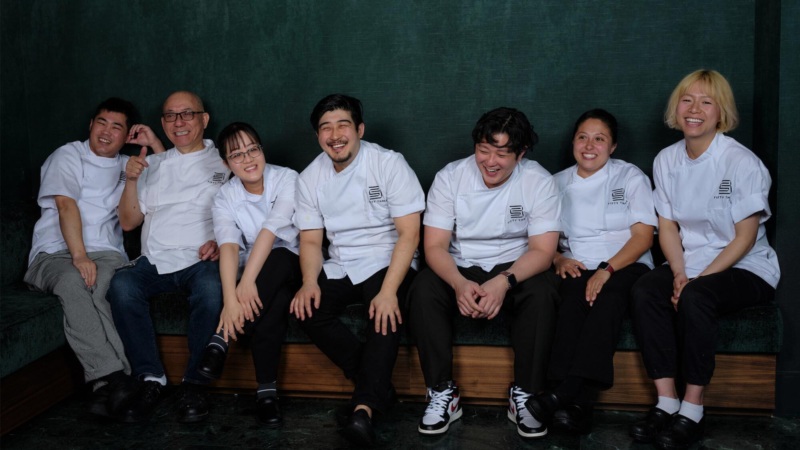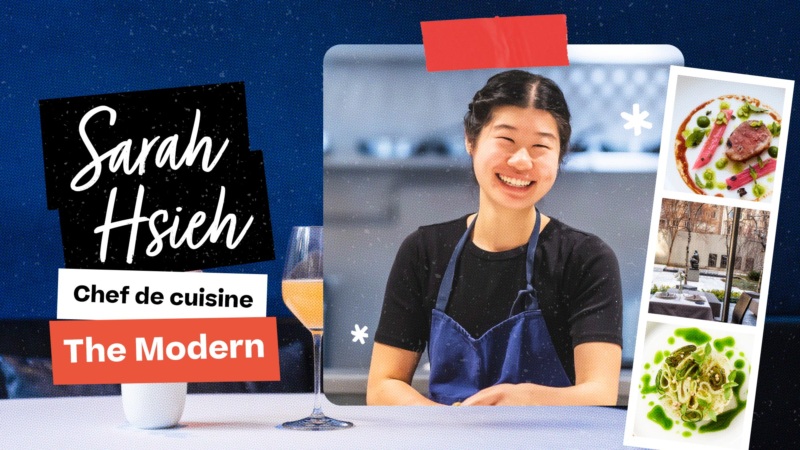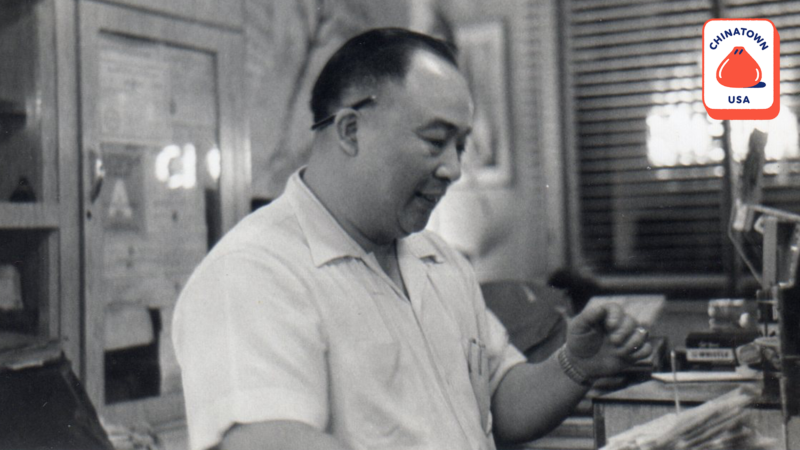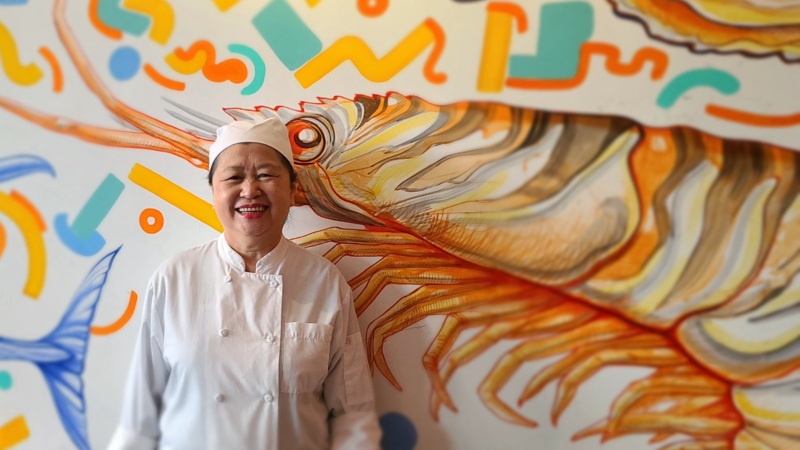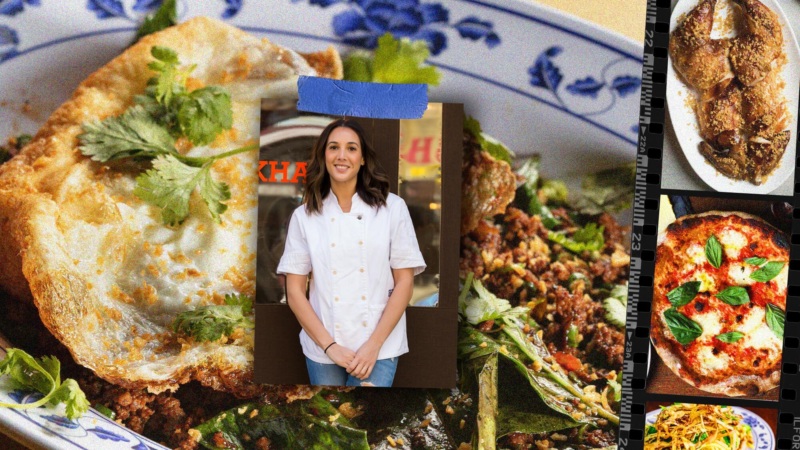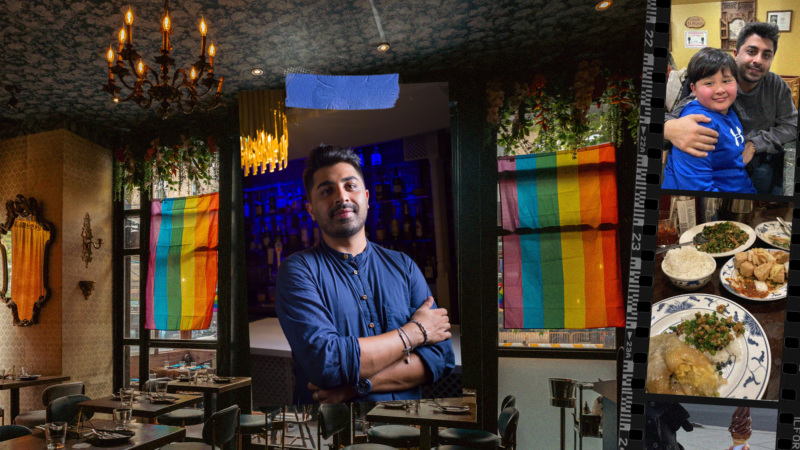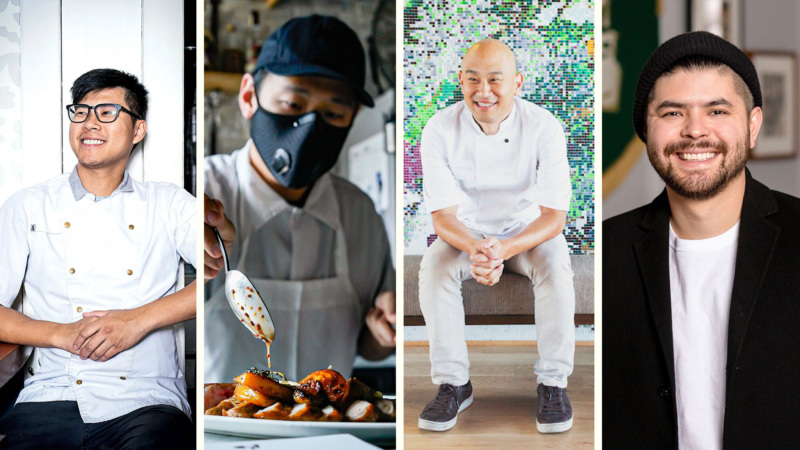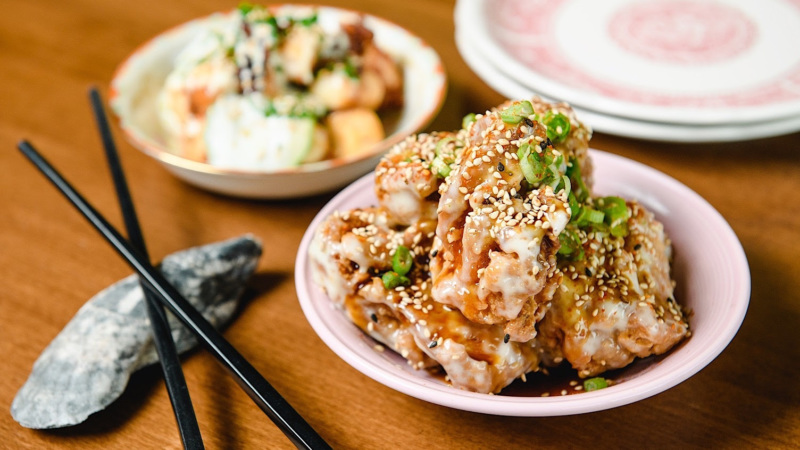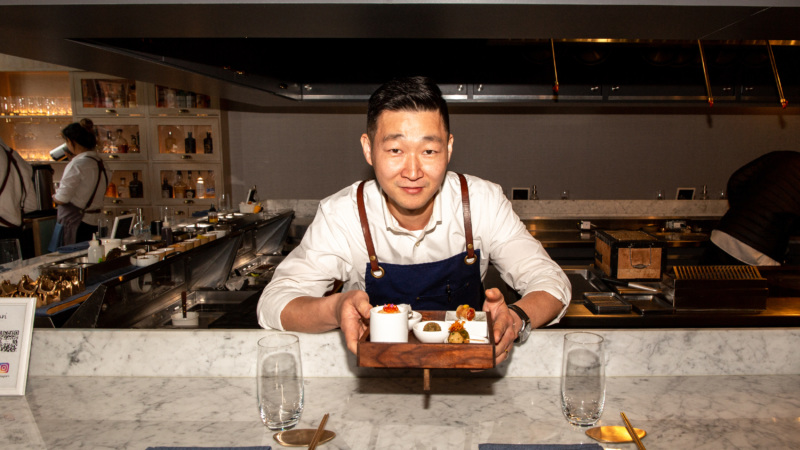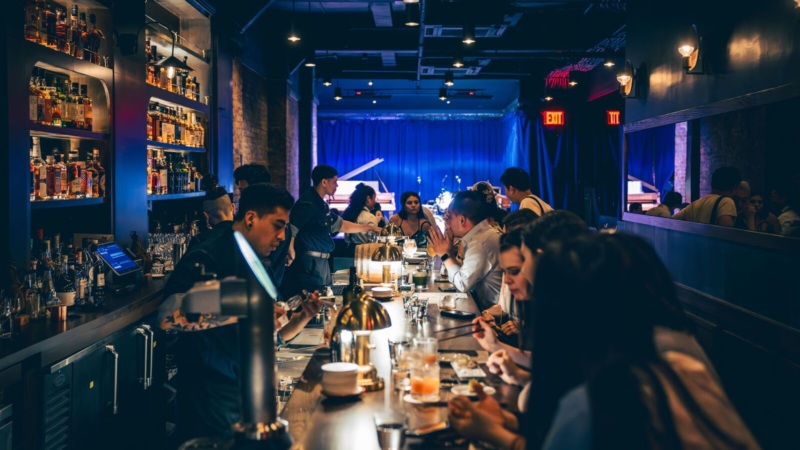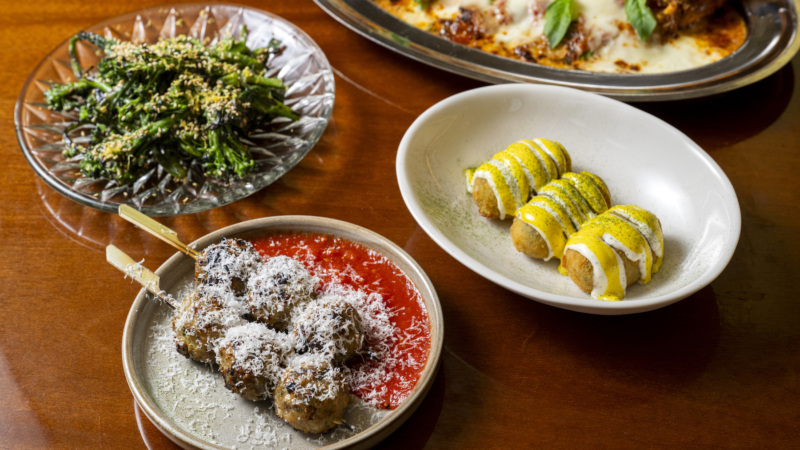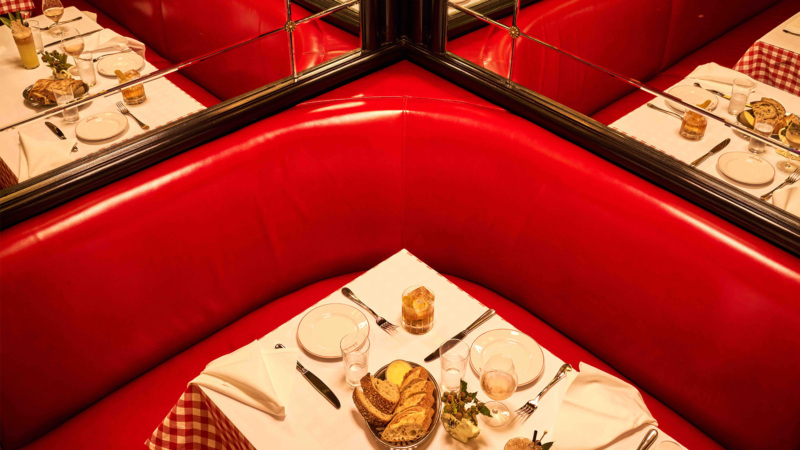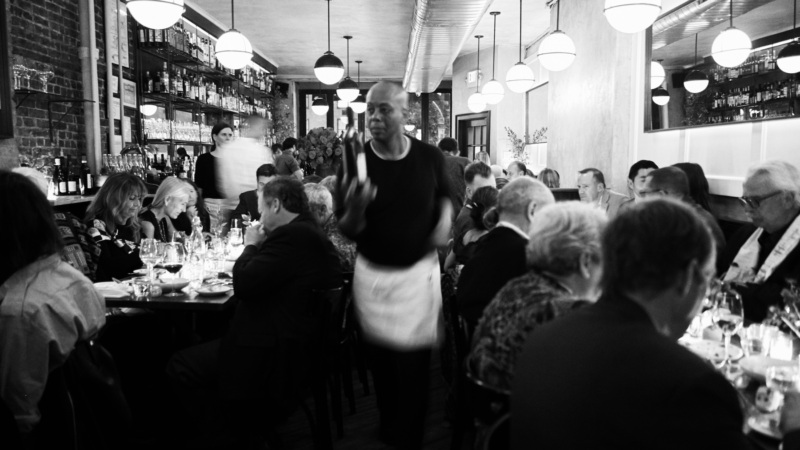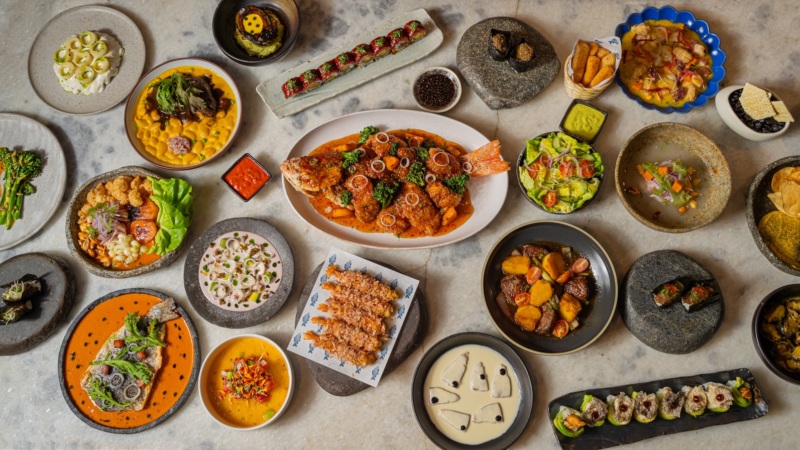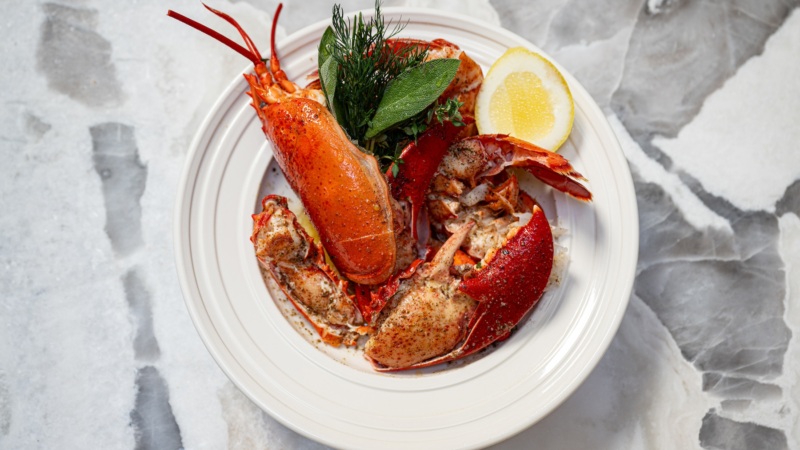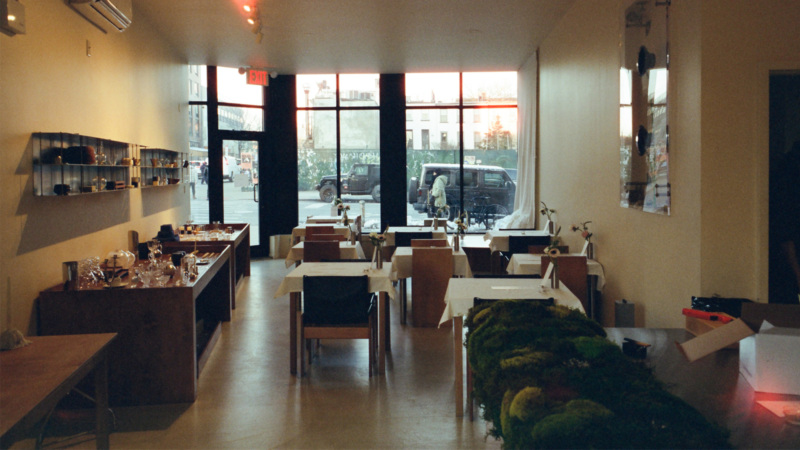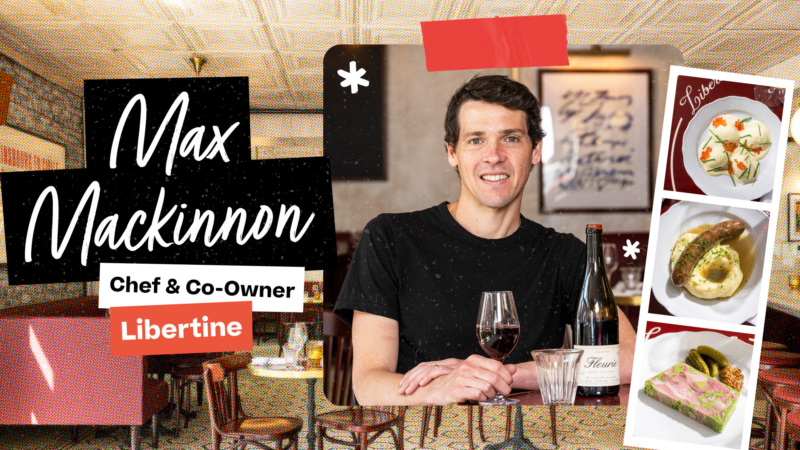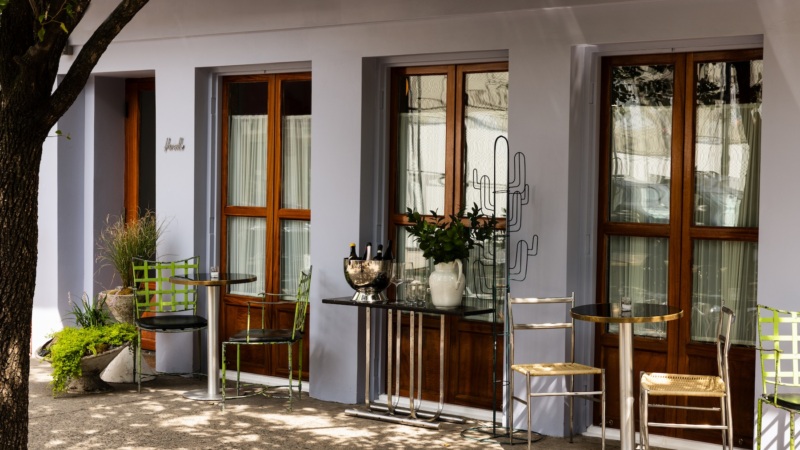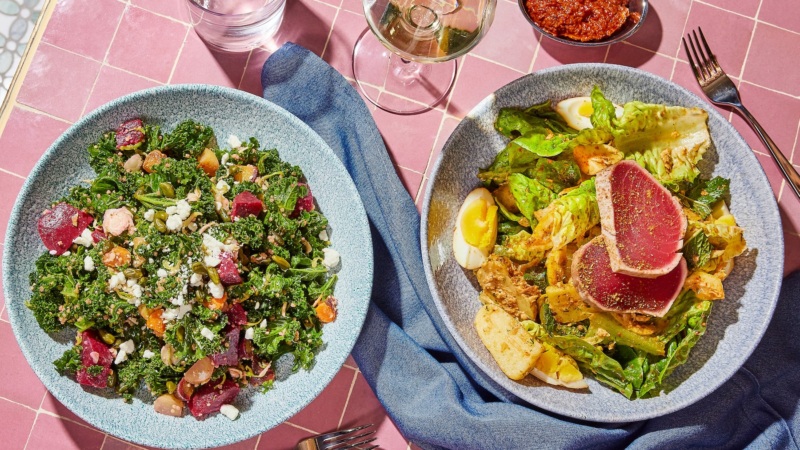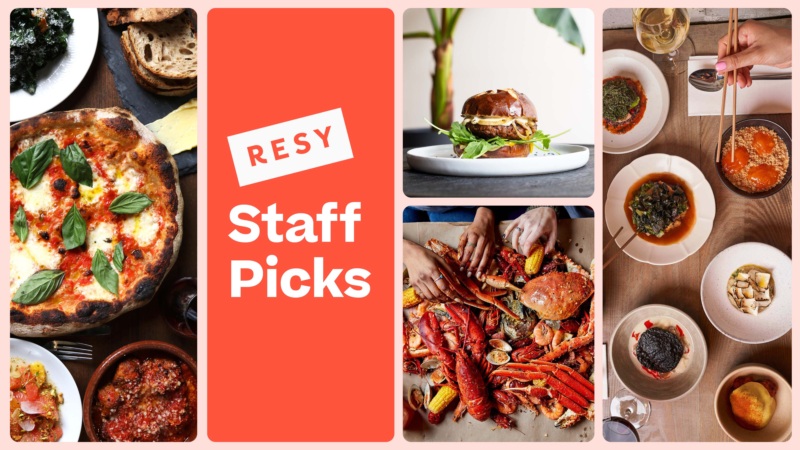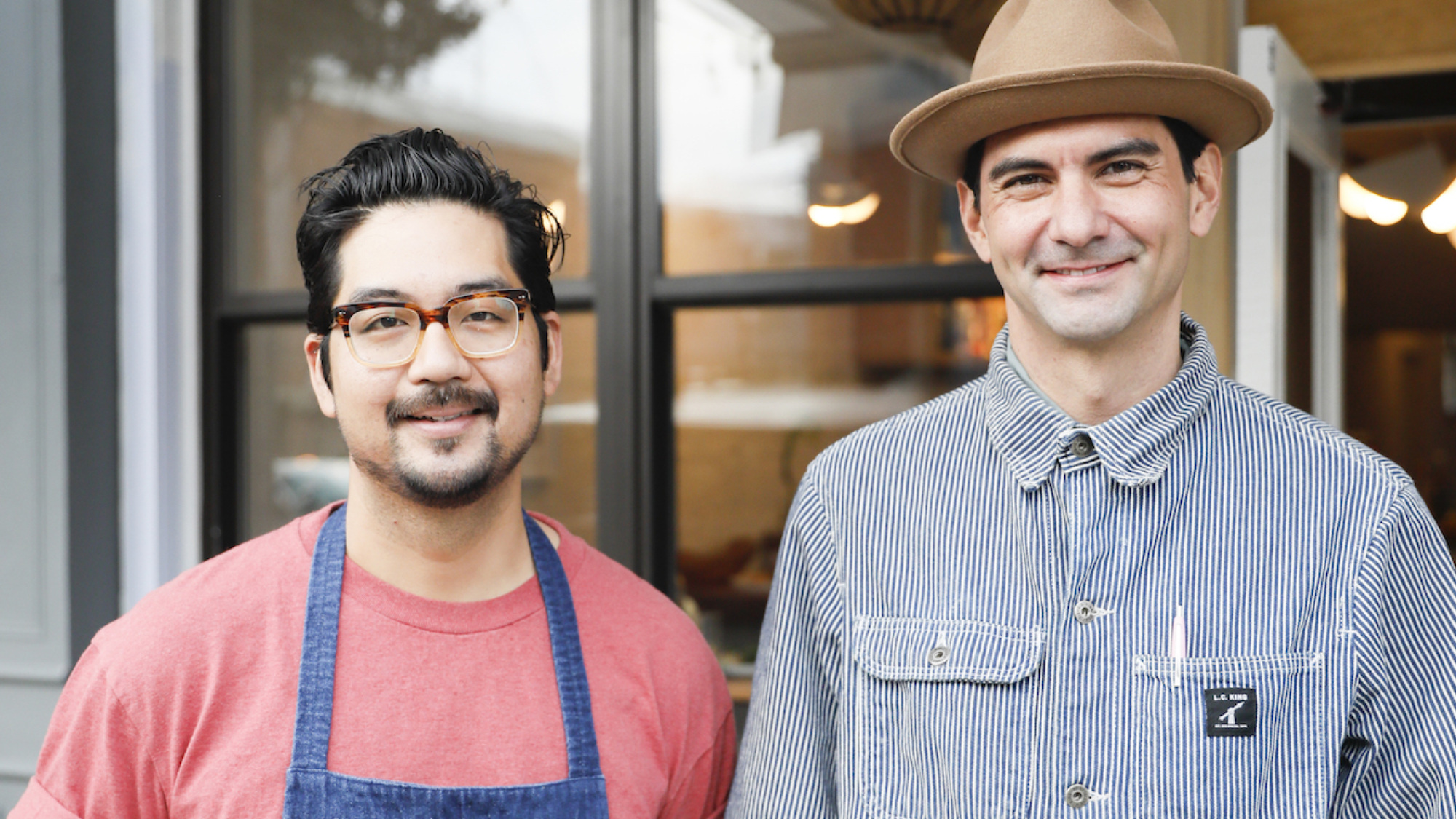
How Brooklyn’s Leland Eating and Drinking House Celebrates AAPI Culture Year-Round
Leland Eating and Drinking House opened in Prospect Heights, Brooklyn, during the pandemic, and while it’s known for serving contemporary takes on Mediterranean cuisine, it’s always had strong ties to the Asian American Pacific Islander (AAPI) community from the start. Owner Randi Lee named the restaurant after his great uncle, Leland Chin, who settled in Oregon in the 1930s and ran a successful restaurant, Chin’s Kitchen, which is still in business to this day. Over the years, Leland has also hosted a number of AAPI-focused events, including their annual Lunar New Year meals and specials.
This May, to commemorate AAPI Heritage Month, the restaurant is serving up a special menu on Mondays, inspired by AAPI cultures and traditions. You’ll find dishes inspired by chef and partner Delfin Jaranilla’s childhood growing up in the Philippines, like pork sisig with a poached egg and Szechuan eggplant. Family recipes like roasted duck with crepes and local striped bass with housemade fermented black bean sauce will also be offered, as will cocktails like a lychee daiquiri and Mai Tai. On weekends, there will be ube babka French toast for brunch, too. But this likely won’t be — and isn’t — the only time that Leland is welcoming diners to celebrate AAPI culture. You can expect plenty more from the Lee and Jaranilla, and we spoke to them to learn more.
More from Resy
Resy: Leland has always hosted a number of events in support of the AAPI community. Why is that so important to you both as chefs and restauranteurs and members of the AAPI community?
Randi Lee: At Leland we welcome everyone into our home every night. It’s important for us to tell a story of where we came from, and to share the flavors that remind us of our own community. Most of the events that we support, like Lunar New Year, we celebrate in our own homes and our lives, so we decided to bring it here to Leland, too.
Delfin Jaranilla: We believe that there’s a sense of duty on our part as being a neighborhood restaurant to celebrate the diverse cultures of our community and that we feed them, including our own. I’m Filipino. Randi is half Chinese. There’s a lot of cross-section there with both of our cultures in this community. So, we really want to celebrate that.
Resy: It’s been a few years since we saw a rise in the acts of hatred and hostility directed toward the AAPI community, which has also had a ripple effect on the restaurant community. Now, three years later, how do you feel about how things are now for the community?
Lee: Well, I don’t want to make this question too political. But our country is in a much better place today than it was three years ago. In fact, we [as a restaurant] weren’t even open three years ago. The way that we look at how or what AAPI means now, it was much different than it was back then. I feel that the awareness of AAPI means that more people are looking past the hatred and embracing Asian culture and our community.
Resy: Do you think the larger community is starting to recognize the AAPI community for more than contributions to food culture too?
Jaranilla: Absolutely. If we just look at this past year with cinema, we’ve got “Everything Everywhere All At Once” taking home so many accolades. Arguably the most talented baseball player coming out of Japan is Shohei Ohtani, and my Netflix hero, Jo Koy, is bringing people together with laughter. So I definitely think people are much more aware of the AAPI community outside of just food and hospitality.
I think it’s easy for us to forget that the United States is 246 years old. And it was built on the backs of immigrants. So Asian food is American food. We are still figuring out what it means to be American.— Delfin Jaranilla, Chef and Partner
Resy: How closely do you both work together when it comes to putting together a menu for the special Monday dinners, and the restaurant as a whole?
Lee: Well, my morning usually consists of texting Delfin something that I’ve dreamt of or read or was inspired by. We speak every day about food, beverage, hospitality, and how we can be more involved in our community. We also speak with our farmers and our fishmongers; we analyze their harvest reports. That’s where it starts, that’s what dictates the conversation with the ingredients. And then from there, it starts to be a conversation about how we’re going to develop the menu.
Jaranilla: We are true partners. We are always bouncing ideas back off of each other. And then you know, I take it on my end and then kind of filter through the efficiencies of applying it to the kitchen. We will both taste together, problem solve together and so, hopefully the end product is something that we’re both really proud of, and happy to serve to.
Resy: What are some ingredients making their way onto the menus this month?
Jaranilla: A really great example this past year is that we started working with Lani’s Farms in New Jersey, and they had this really beautiful green yu choy, which is a cousin of bok choy, but with a less thick stem. It sautés very well. It’s got the same flavors, but it’s got a slight bitterness to it that’s still juicy. We bought so much because we were running a special and it was so popular. Our connection over at Lani’s told us, “Chef, we’ll plant more seeds for you.” And so they started growing it year-round. And so now, it’s a staple on our menu, and we’ll change it seasonally to reflect the season. It’s such a great green to pair with your proteins, where you can just enjoy it as a mid-course. That’s something that’s really cool, that we can go to our farmers and be like, “Hey, we really love this product. Can you make it for us? Can you produce it for us all year long?”
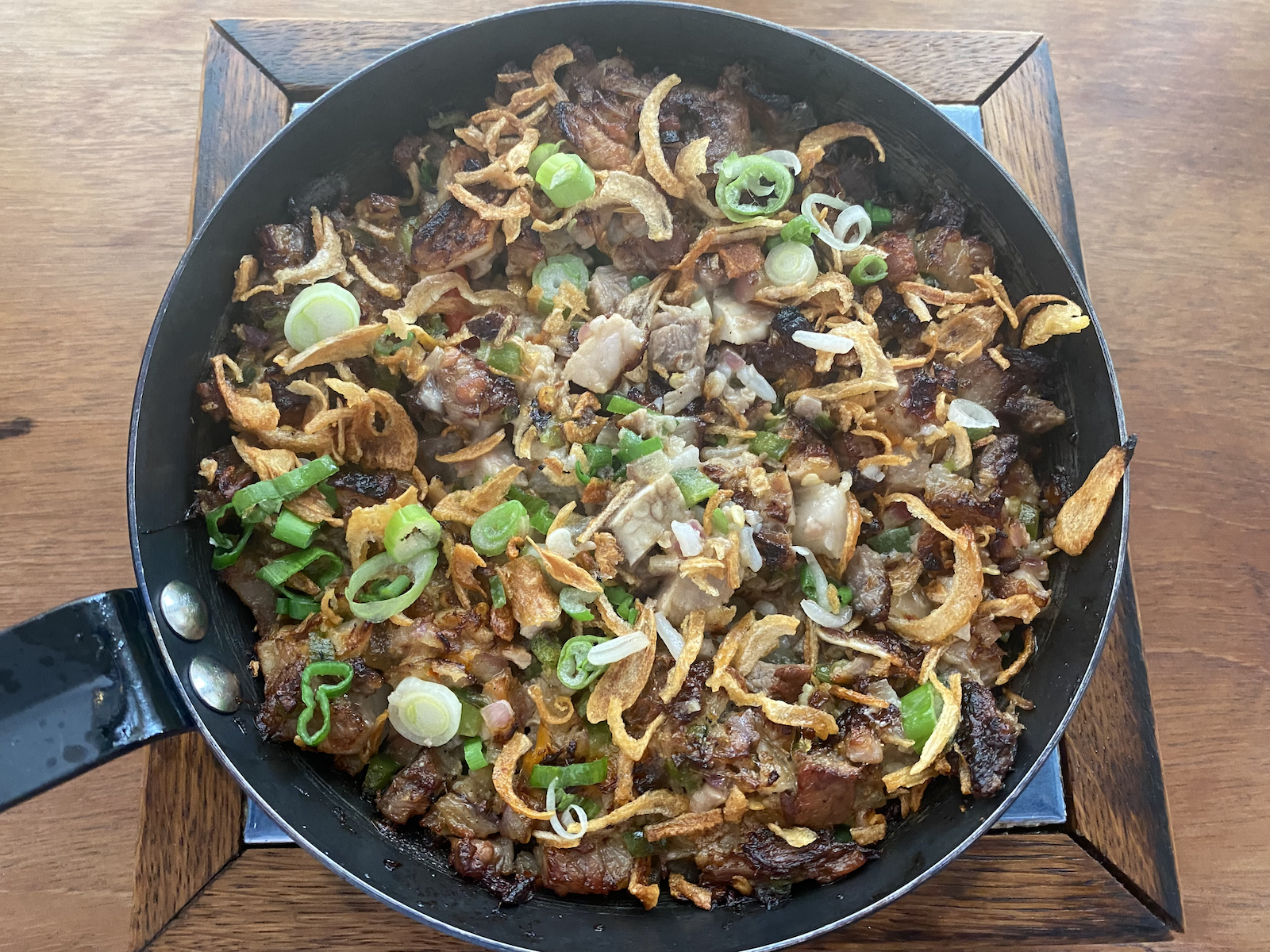
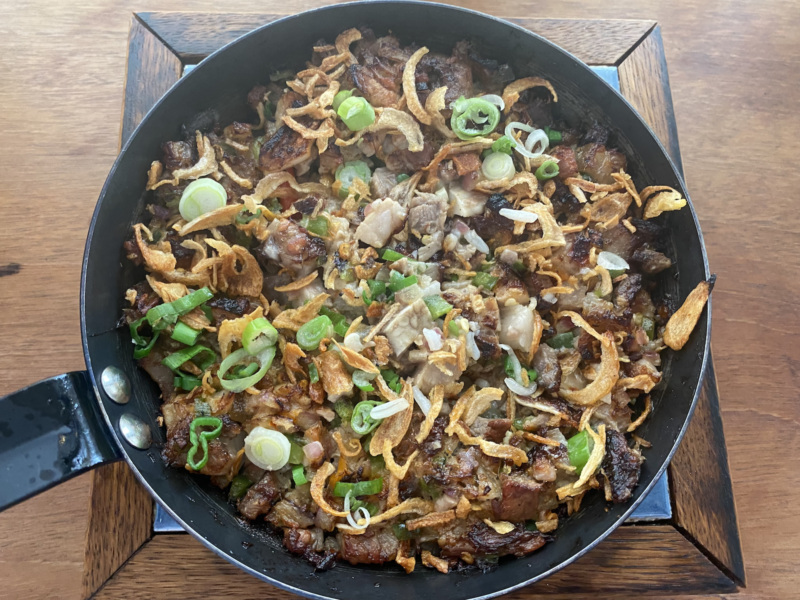
Resy: Delfin, can you tell us about your experiences as a Filipino American immigrant? And how did that shape you?
Jaranilla: It’s been a wild 38-year-long journey. It’s not unlike a lot of Filipino American immigrants or even Asian American immigrants; it’s a dichotomy between feeling like you still belong to your native culture back home, but also being able to succeed in a new country that’s totally different and operates under different sorts of socio-political environments. I’m just trying to do what I love and be able to look myself in the mirror and be happy with what I’ve done. I love cooking and I love feeding people. I think it’s one of the most rewarding things you can do.
Resy: Can you tell us about some of the dishes on the menu that reflect your heritage, and can you tell us about your thought process?
Jaranilla: Randi is half Chinese and I’m Filipino, and we do a Lunar New Year pop-up for a whole week whenever Lunar New Year lands and flip the whole menu to an entirely Chinese-inspired menu. We’re just on the backs of a Filipino pop-up, so what I really want to focus on this month is other Asian American cultures. For example, the lobster spring roll that we’ll be doing is really celebrating the fact that ramps are peaking right now. We’re pairing Maine lobster with ramp leaves, and wrapping that into a summer roll with some vermicelli inside — it’s an ode to Vietnamese culture. We’re also going to be offering some local Long Island Crescent ducks; we’ll be roasting them after letting them dry-age for five days — that’s going to be really great, especially because it symbolizes prosperity, sharing, and community. I think we’re just really excited to be able to bring out some of the other Asian American cultures.
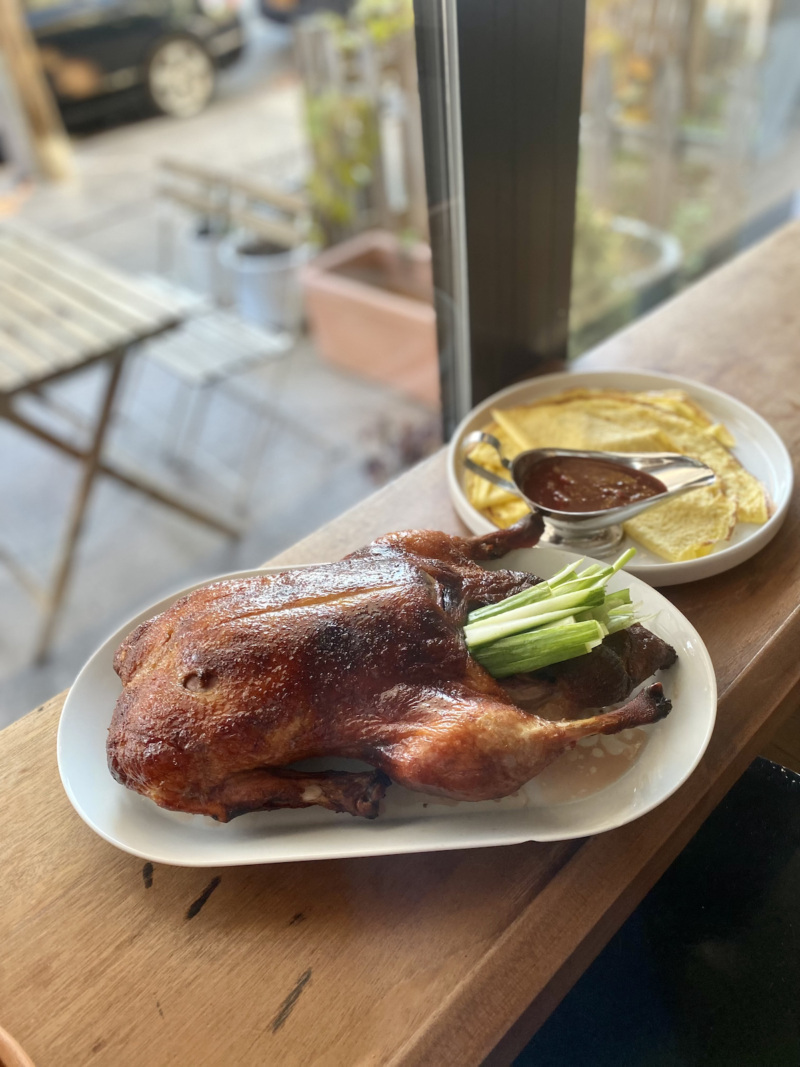

Resy: I heard the ducks need to be reserved ahead of time. How many are available?
Lee: We haven’t really figured out how much we’ll have available. For Lunar New Year, we would only be able to have four unfortunately, and everybody would come in at eight o’clock and be like, “Where’s the duck?”
Jaranilla: I have people message me and ask, “Are you running that again today?” It’s so cool that we have so many regulars, and they’re always so excited to come. We have people that have been here 50-plus times. And they’re still just as excited to come in and enjoy themselves here. So, it’s really inspiring; it continues to push me to think of new things to present to them, so that they don’t get bored.
Lee: One of the other things Delfin hasn’t really touched on, something that is our ethos in the kitchen and in our lives, is that while there’s a lot of pedestrian food that we may serve that’s stuff people would recognize, it’s very rare that you’d go to a Chinese restaurant or Filipino restaurant and be able to get heritage pigs or Crescent ducks. Or tuna that’s caught right off Montauk. Those are the things that make our food a little bit more unique: It’s the story about the ingredients and where they come from.
Resy: Randi, can you tell us about your experience as a Chinese American member of the AAPI community?
Lee: Well, mine’s a little bit different from Delfin because I’m half-Chinese, half-European. I grew up in a predominantly white neighborhood suburb of Portland, and our Chinese community was deeply rooted in Portland since the 1940s; we originally were hop farmers. My great-uncle Leland was the one who saved my grandmother’s side from Dalles, Oregon, and brought them to Portland. In 1948 they opened up their own restaurant called Chin’s kitchen, which, during that time, was probably not the most popular restaurant, but the community kept it around and it’s still there today to survive. But it offered a community, which was something that I felt: like my whole Chinese community, whether they were speaking English or not, welcomed us into their homes with food, and gave us an opportunity to understand a little bit more about where they came from and their culture, which was something pretty special for us.
My brother and I remember a lot of interesting things about our experiences as Chinese Americans, but I think that the most important times were during celebrations, when the whole family would get together and eat similarly to how you eat here: family style. And that’s when Delfin and I sat down and talked about the menu — it was really important for us to try to curate a menu where people can communicate across the table and break any sort of divisions that would separate people by having great food.
Resy: What type of food did you eat during those celebrations? Has that made it onto the menu or the cocktails you’re creating?
Lee: Well, rice was always king in our household. And I know it is here: Our family meals are predominantly rice-driven, which makes me very happy, because at every Italian restaurant that I ever worked at in my 25 years, it was pasta. And by the first hour, you were about to fall asleep.
We always had rice in our fridge, and we always had a wok on our burners; that was the go-to: fried rice for a family of four young kids growing much bigger than most of the other families. We would have fried rice almost every night. Sometimes it was a main dish, sometimes it was a side, and you would use leftover meats, sometimes leftover fish, shrimp, whatever was from the fridge, and then incorporate those fresh pops of flavor — lots of ginger, crunchy rice, chiles, cilantro. Those made it really kind of special. You never forgot that flavor. You’d have like one bowl and then another, so I’m looking forward to doing a little bit of fried rice.
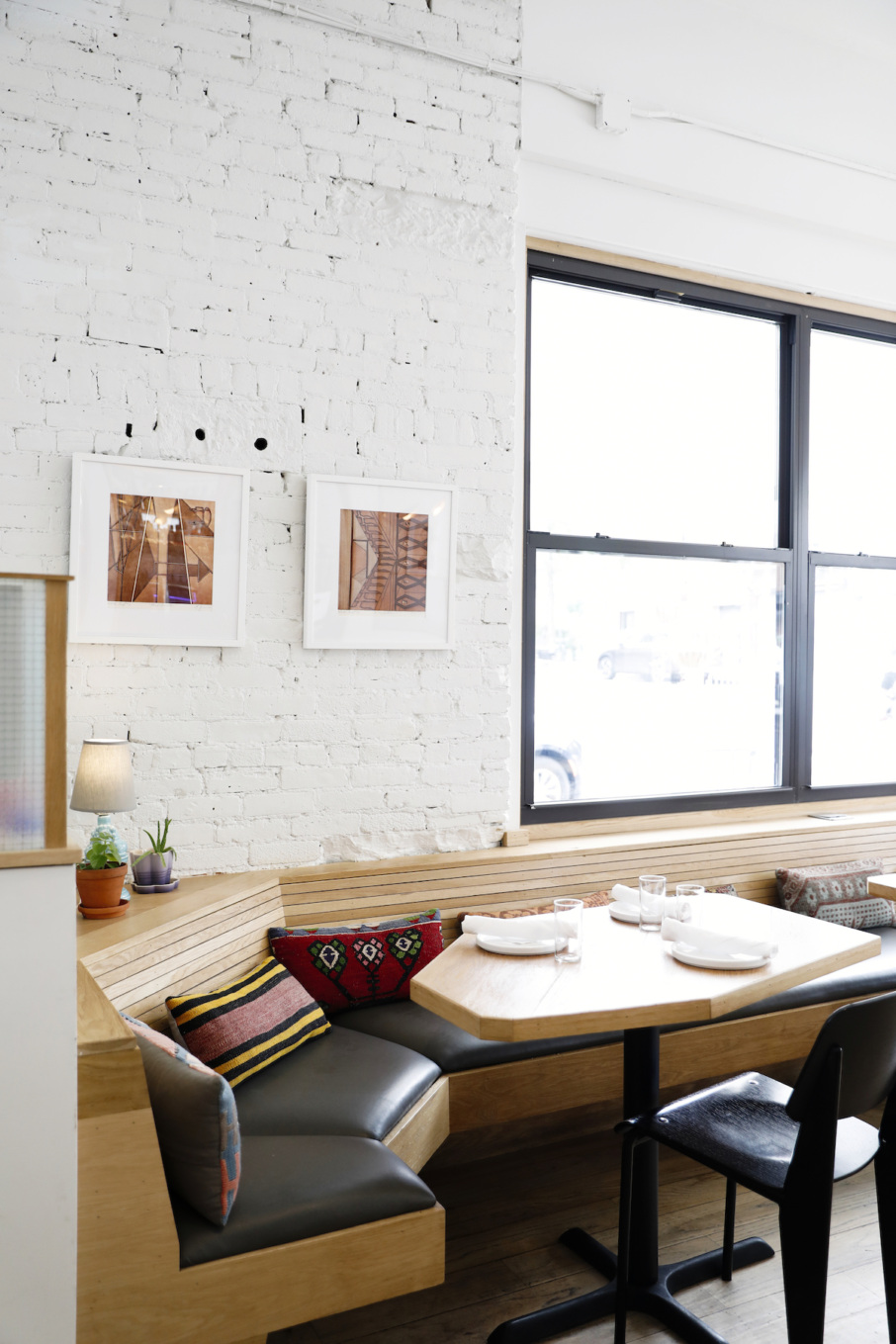
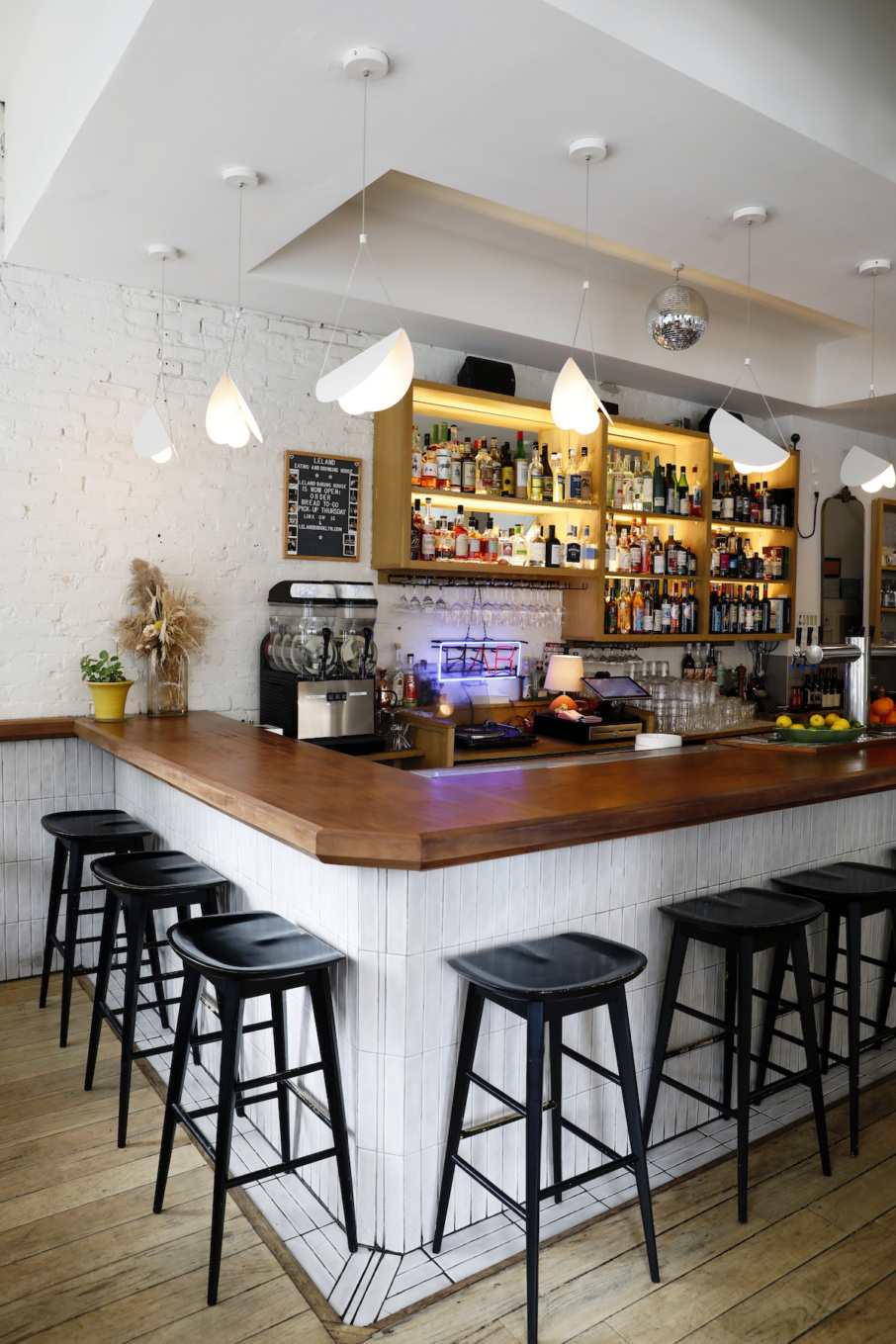
Resy: Can you elaborate on how your families have connected over food?
Lee: Our family always met once a day at dinnertime. During the holidays, we would gather with our relatives again. Half of the table would speak English, half the table would speak Cantonese; that was sort of the protocol there. You communicate mostly over food to be cooked. Jook [rice porridge] was always in our fridge. We would get home from a soccer game and it was cold, especially in the Pacific Northwest, and most likely drenched in rain, and my mom would always have a jook in the back of the refrigerator that we were able to warm up, put an egg on top, some fresh scallions, and a bit of soy sauce. Those are the kind of memories that I have of us all getting together around those comfort foods.
Jaranilla: My experience is very similar, at least when my family arrived to the United States from the Philippines. Both my parents worked jobs to get us through, and my mom was a nurse, so she worked double shifts sometimes. It was the same thing: dinnertime was when we would all meet up with family. I have two brothers and for half of the year, my grandma would be staying with us, and she is the reason why I started cooking. She was amazing. We were always very excited when my grandmother was spending her six months in the States, because we knew the good stuff was coming. And my mom is also a very great cook. But again, she had 12- to 16-hour shifts; she was exhausted at home. It was super special when my grandmother was around.
And when I would go visit back home in the Philippines, I was always super surprised by how many times my cousins and my aunts and uncles ate throughout the day. Maybe it’s just the vacation thing, but we would wake up at seven in the morning and have a super early breakfast of rice and eggs. There’d be spam and some dried fish. And before you know it, it’s time for a merienda. Merienda is this word that they have for the in-between meals between breakfast, lunch, and dinner; there’s like three meriendas in there. Maybe it’s a combination of the humidity and weather and you’re just always sweating. I don’t know what it is. But every time I go back home to visit my family, I bring back like 15 pounds. We eat twice as much. So, food is definitely a central part of our culture.
Resy: What was your favorite thing that your grandma would cook that was the most memorable?
Jaranilla: I make it all the time for family meal here; it’s called sinigang. It’s a pork-and-tamarind soup. We get these really great pork neck bones that are split and they just make an amazing broth of stock that just pairs so well with the tangy tamarind fish sauce in there. It’s just one of the most comforting things.
Resy: Outside of the special menus at Leland, are either of you doing anything special to commemorate the month? Anything you’re keeping in mind?
Lee: We are learning how to play mahjong. When we would go over to my grandfather’s house, there would be a big dinner with all the cousins. The women would be upstairs cleaning up after dinner and the men would go downstairs and you’d just hear this click, click click. All the cousins would be running around outside and we would sneak into this smoke-filled room where they would all be laughing and yelling at each other in Cantonese.
Mahjong was something that I’ve never learned and recently, we ran into a mahjong master named Lenny who’s introduced us to Hong Kong-style mahjong, which is really fun. A lot of people have different versions of it, but this is the most widely known in the Chinese community, and has a lot of symbolism about the wall and the winds and the directions, and it’s been really fun learning how to do that. We hope to bring it to all of the Leland fans here and have a night, maybe out on the patio, where we can have a mahjong party. Obviously, part of that is eating and drinking while we’re doing it, so having a Mai Tai or some steamed buns or any of Delfin’s delicious food is really great. Especially stuff that you don’t have to use any silverware with, because mahjong is a very hands-on, tactile thing.
Jaranilla: Mahjong was also very, very prevalent in my household. I remember sneaking out, going out with my friends, and then coming home not knowing that my mom and my grandmother and my mom’s nursing friends would be playing mahjong. It was different in my household; the matriarchs were the mahjong sharks. They’d hear me opening the automatic garage door when I’d be pulling up and then I’d open the door and all these ladies would be there. It’d just last all night long, way into the wee hours of the morning, and my grandmother would be taking all their money. It was really fun. She and my mom got to the point where I could watch them pick up a tile and they could tell which one it was just by feeling it with their fingers. It was like second nature.
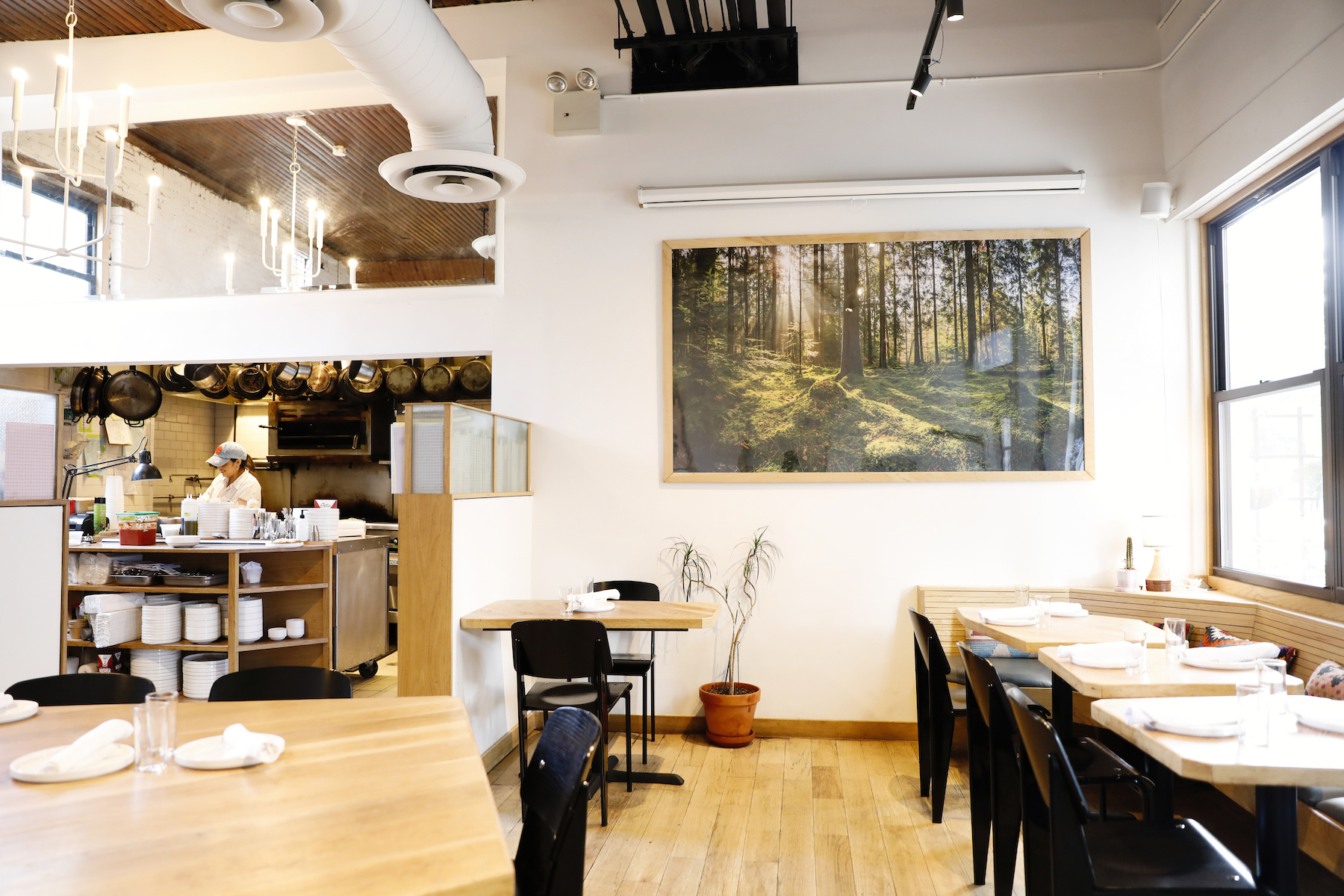
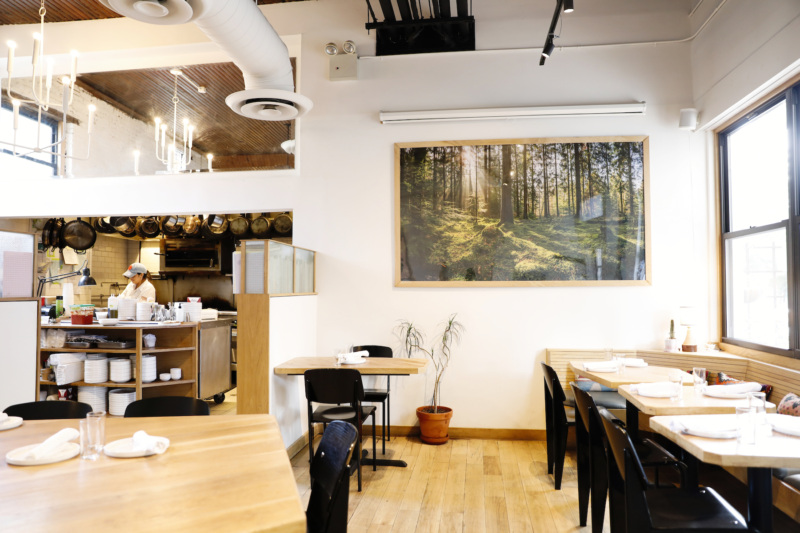
Resy: Anything else you want to add?
Lee: I hope everybody has an amazing month of celebrating the culture, the food, and all of the stories that come from every one of these dishes that we love, because there are certain personal stories that come with everything. For us here, I hope everybody knows, or at least walks away with the fact that we’re putting everything into curating the menu here at Leland. And what we do every day, there’s dozens of people from our prep team, bakers, porters, cooks, bartenders, chefs, food runners, everybody contributes to making it a success here. And it’s not just Delfin and myself; it takes a whole family, and the Leland family is pretty strong. And they all roll in the same direction: They want to learn more and create fun, exciting dishes, so come by and say hi.
Jaranilla: I think it’s easy for us to forget that the United States is 246 years old. And it was built on the backs of immigrants. So Asian food is American food. We are still figuring out what it means to be American. I think this month is a great time to reflect that. For one, Asians were here and longtime ago. Filipinos got here on Spanish galleons in the 1500s. And not a lot of people know that, so I think for us to be restaurateurs and running a neighborhood restaurant and being fortunate enough to be given a platform to talk about our experiences, I think it’s really something we don’t want to take for granted. I think that when we do these things, people pay attention, and we do our part as much as we can to pique people’s curiosity and invite them to eat our food. Our food is comforting. It’s nostalgic. And it’s local and seasonal. It’s hard to not have a great time when you come back.
Leland Eating and Drinking House is open Wednesday through Monday for dinner, and open on Saturday and Sunday for brunch. The special AAPI Heritage Month menus are available on Mondays from 5 to 10 p.m. through May 29.
Deanna Ting is Resy’s New York Editor. Follow her on Instagram and Twitter. Michelle Lee Greenbaum is Resy’s Social Manager. Follow her on Instagram. Follow Resy, too.
Discover More
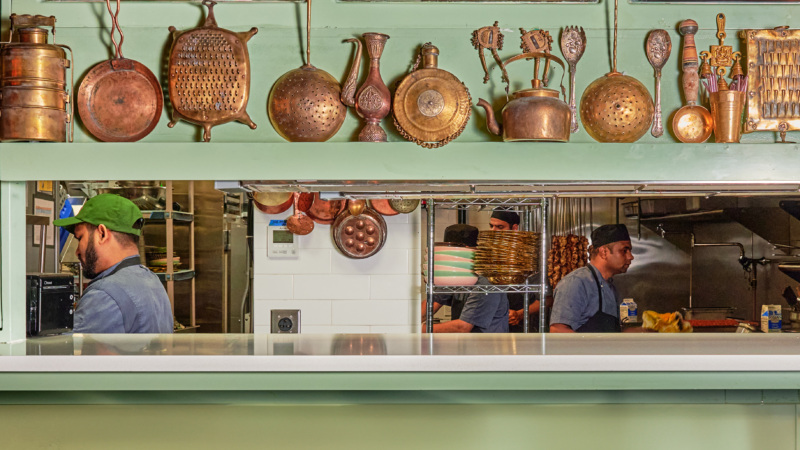
Stephen Satterfield's Corner Table


